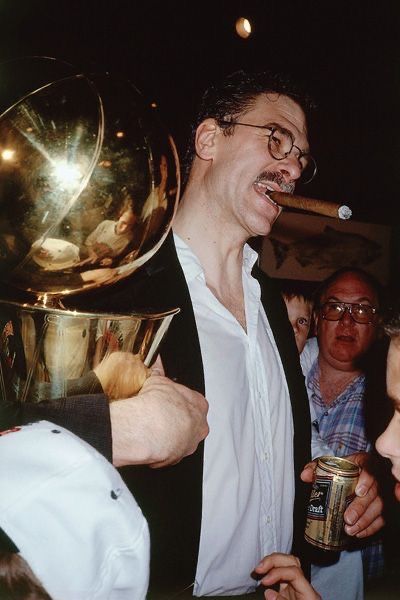Category
General
Date
Jul 5, 2024
Author
Asher Flowers
First of all, I understand the rationality behind a commission structure. As a brand owner myself, I want what I’ve built to be shoulder to shoulder with great brands, a desire to seek complementary listings and an internal competition of being in ‘the best distribution points’, the ‘best menus’ and having ‘the best liquid’ - always focusing on ‘the best.’ - we all want the best. Nobody wants to say they’re with the 4th best distributor. However, every commission structure I’ve seen presents several challenges that undermine those goals. My brand, ‘Broken Barrier’ is a 100% Agave Tequila that’s naturally infused with flavour, so I’m happy to play on the fringes, seeking menu listings rather than house pours; however, yet established distributors with commission structures and high barriers to entry felt archaic and a number of sales agencies, didn’t have the team to scale the brand. So, I created Lateish Drinks.
Lateish Drinks' founding team includes a brand owner and a global sales director, who bring together over 25 years of combined experience in the food and drink industry. We joined this space to work in a sector driven by hustle and hedonism. But we’ve found that the bigger the industry gets, the more disjointed the distribution model. So we pooled our resources, modernised the approach, and persuaded some of the industry's freshest faces to come along.
Before we get into this, it’s important to note that this is not a critique of all distributors. Market forces are making the industry more challenging for brands, customers, and consumers. Rising energy prices, the UK’s duty tax being 40% higher than the average European country, and our hospitality industry paying 20% VAT compared to other European countries (Belgium is 6%) are significant contributing factors to this challenge.
However, with this in mind, I’ve had thoughts on the commission structure; here are a few:
Misaligned Incentives.
In principle, commissions should be motivating – the harder the sales team works, the more money they make, and the brand owner benefits, too. However, this structure often encourages short-term gains over long-term sustainable brand-building. It’s human nature for a salesperson to prioritise products that offer immediate commissions over those that align with the strategic vision of quality and brand fit. For example, suppose you have an exciting but niche brand (an infused tequila), a salesperson might mention it briefly but then focus on selling a higher volume product like vodka, which offers them quicker commissions. This misalignment can prevent your brand from getting the attention it deserves and needs for sustainable growth.
Take that infused tequila – a beautiful product in a rapidly growing UK market, but it will never match the sales volume of a house-pour vodka. If a distributor carries 60 different brands and 150-200 products, can a sales team of 10 realistically get the brand out there? Probably not, and it’s understandable. Why would they prioritise a niche product when quicker commissions come from higher volume sales? It exemplifies how the current model can lead to a lack of attention for unique and niche products.
In an ever-growing competitive environment, that particular tequila competes with the distributor's portfolio and against numerous other brands vying for attention. Achieving visibility and market share becomes daunting amidst the noise of higher-volume products with more immediate financial incentives. Furthermore, the pressure to conform to the distributor's higher sales demands can compromise pricing, promotional strategies, and brand integrity. This compromises the brand's ability to build a sustainable, premium brand image and erodes its long-term profitability.
At Lateish Drinks, we wanted to build a retainer model over a commission-based structure to benefit brands in the short and long term. We’re not seeking the most extensive portfolio; we’re seeking brand partners who share an ambitious vision of growing globally. Our brands benefit from consistent and dedicated efforts across sales and marketing activities. This model ensures sustained attention to brand messaging, market presence, and relationship building with wholesalers, customers, and consumers. By prioritising ongoing support and expertise rather than transactional incentives, brands can continue to reinvest in their growth, knowing they have a dedicated team working towards their success. Our approach fosters stability and predictability in budgeting and resource allocation, allowing us to build a strategic plan with our brands and cultivate a loyal fan base over time. By prioritising ongoing support and expertise rather than transactional incentives, brands can continue to reinvest in their growth.
Another sector to consider is in the non-alcoholic to low-alcohol space. The market's growth presents challenges, especially during tough Autumn/Winter periods. However, when January arrives—the peak time for healthy lifestyle choices—brands should ideally benefit the most. Instead, they often face heavy commission fees, hindering their ability to capitalise on increased consumer interest.
This paradox highlights a fundamental flaw in the commission-based model. It penalises brands precisely when they should thrive. A retainer model or alternative fee structure would better support these brands by removing the burden of high commissions during critical sales seasons. This shift allows brands to reinvest resources into innovation, marketing, and market expansion, enhancing profitability and maximising seasonal opportunities for sustained growth throughout the year.

Market Saturation
It’s always been a distributors market, but as an industry we need to ensure we’re not being cavalier with our own capital, or that of investors. Distributors can cherry-pick the most exciting, well-funded brands and promise them great opportunities in the market. It's like a dating game, full of promises of riches. But in reality, you're just one in a roster of many attractive brands, all promised the same false riches, with commission as the main factor determining your appeal. For example, a distributor might handle eight Gin brands, selling 18 different flavour/brand variations. This saturation means that no matter the quality or distinctiveness of your brand,, it can get lost in the crowd, especially if it doesn't offer immediate high-volume sales. That gin brand is not just competing with brands in the portfolio but with every other distributor in the market, all fighting for the best locations. It becomes a battle of brand awareness, pricing, and just getting a meeting with the sales team.
Yes, the brand is flattered told and of course is a "favourite," but then your distribution partners start suggesting, “lower your price” or "maybe throw more money at marketing fees; our customers love that." Ultimately, you're spending more than 25% of your expected turnover on marketing, eroding your margin for "key listings," and hiring a salesperson to whom you must also pay a bonus. If you don’t have transparency around effort, listings and acquisition It can often be expensive 20%.
At Lateish Drinks, we differentiate ourselves by focusing on fewer brands and offering category exclusivity per market, such as having a single traditional vodka brand. This focus allows us to provide unparalleled personalised attention and strategic direction to each brand within our portfolio. In a saturated market where diversity often dilutes efforts, our commitment to category exclusivity ensures that every brand receives tailored sales and marketing strategies that maximise its unique strengths and market positioning.
Navigating the complexities of competitive markets requires a deep understanding of category dynamics, consumer behaviours, and emerging trends specific to the category. Our centralised team means that our approach to brand building is cohesive. Starting with a focus on the UK, we are building a global team with the ambition of hiring staff in key cultural capitals.
Ultimately, Lateish Drinks' category-exclusive model positions brands for enduring success. By combining strategic foresight with hands-on execution tailored to category-specific nuances, our goal is to empower the brands we represent.
Reaching critical mass
Reaching critical mass in a once-promising market can quickly become frustrating when your distributor's ambitions differ from yours. You've diligently secured 60 distribution points in London and 40 in Manchester, achieving significant milestones. However, your vision extends far beyond their limited capabilities. With only three sales staff and a 20% commission structure, their capacity to drive rapid growth falls short of your ambitious national scaling plans.
As you strategise and invest in market penetration, your distributor continues to profit from your efforts without fully supporting your expansion goals. This mismatch leads to perpetual cash burn as you deploy resources to hire local staff and execute strategies while they benefit from every sale. Despite your salesperson's efforts to reach 20 locations weekly, translating to 220 locations over 11 weeks with a 10% success rate, the distributor's commission further eats into your margins.
The challenge intensifies when considering expanding these efforts across multiple markets, where significant investment in salaries, travel, and marketing becomes necessary to sustain growth. This scenario underscores the critical need for distributors whose ambitions and capabilities align with yours, ensuring mutual growth and success in competitive landscapes.
We've designed a retainer-based model to address these challenges at Lateish Drinks. With a dedicated team of 10 sales professionals in the UK, each engaging with over 30 decision-makers weekly, the potential impact over 11 weeks is substantial—reaching 3,300 of those decision-makers. This proactive approach allows us to outpace market expectations and provide you with actionable insights and growth opportunities swiftly.
We want to beat the market at pace and replicate this success in global markets while giving your brand the margin to reinvest in itself.
Customer Relationships
Building strong, lasting relationships with your partners is crucial for your brand's long-term success. A commission-heavy focus can strain these relationships, as the push for higher sales can sometimes come at the expense of satisfaction and trust. The best relationships allow for vulnerable honesty and listening to one another’s needs and wants.
Now, that same Gin brand, competing among those other eight brands in the portfolio, each with their stresses, worries, and fears, is likely to be more comrade than competition - taking on the big brands who rule the roost. That Gin brand needs to be cosying up to that distributor. They may hear the challenges that brand faces, but are they truly listening? Or will they drop them for a brands with lower expectations, with more capital raised, or the new kids on the block? The challenge lies in ensuring that brand is forever a priority.
The challenge we face with the commission structure in the UK is that everyone’s making a margin, on a margin, on a margin, and then you’re battling forces such as VAT and duty. It prices you out of brand-building locations, the key indies, the places of discovery—yes, you may sell a bottle or two at a deli in East London, but that's what is going to build you a community. We understand this because we’ve been there.
Innovative Stagnations
A rigid commission structure stifles innovation by discouraging sales teams from taking risks on new products or market strategies that may yield delayed commissions. This reluctance can hinder a brand's ability to evolve and stay ahead in dynamic markets. Innovation is about looking beyond existing data, often reflecting past trends rather than future possibilities.
Consider flavoured tequila as a prime example. Who could have foreseen its staggering 974% growth in the USA from 2017 to 2022? This explosive growth underscores the potential of innovative products in transforming markets.
At Lateish Drinks, our retainer model fosters an environment where innovation thrives. We empower our sales teams to explore and champion groundbreaking products and strategies by removing the pressure of immediate sales commissions.
Working With Distributors
While it's tempting to place all the responsibility on the distributor, it's crucial to recognise that they face similar challenges, ambitions, and needs as brand owners. The UK market is highly attractive but demands time and patience for your brand to establish itself across various categories, not just spirits.
Growth depends on your brand's ambition and strategy. Are you aiming to penetrate the entire UK market or focusing on key cities? Where are the other brands listed in your distributor's portfolio? These essential questions ensure transparency and alignment with your distributor's operations.Remember, you can't force consumers to buy your product. The competition is fierce and growing stronger.
At Lateish Drinks, we understand these dynamics intimately. We work with distributors in local and global markets, ensuring your brand remains a top priority. Our dedicated UK team covers all major sales channels, allowing you to build at pace. Whether your brand is with us for a chapter or the entire story, we aim to position you for legacy creation or future exit.By partnering with us, you gain a team dedicated to navigating market complexities, ensuring your brand not only survives but thrives. Together, we'll build a sustainable and prosperous presence in the UK and beyond.
Conclusion
One thing remains clear in navigating the complexities of today's beverage market: the traditional commission-based model is showing its limitations. Its shortcomings are increasingly evident, from stifling innovation to straining customer relationships and hindering long-term brand growth. We've recognised these challenges firsthand at Lateish Drinks, so we've pioneered a retainer-based approach prioritising partnership, innovation, and sustained brand success.
Focusing on category exclusivity ensures each brand receives dedicated attention and strategic guidance tailored to its unique strengths and market dynamics. Lateish Drinks fosters solid and lasting relationships with our partners built on trust, transparency, and mutual growth. Our commitment to removing the barriers of short-term commission pressures allows us to champion innovation and drive market-leading strategies that anticipate and shape future trends.
As we look ahead, our goal at Lateish Drinks is not just to navigate the current landscape but to redefine it. We believe in creating a space where brands thrive, consumers discover, and excellence in liquid can be celebrated. With our forward-thinking approach and unwavering dedication, we continue to empower brands to reach their full potential and lead the charge in an evolving industry.
Join us on this journey towards a future where innovation, integrity, and partnership reign supreme. Together, we can raise the bar for what it means to succeed in the dynamic world of beverage distribution.



